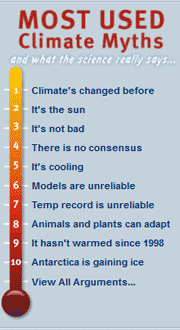Gaia Speaks: Can You Hear Me Now?

1992 World Scientists' Warning to Humanity
“Human beings and the natural world are on a collision course. Human activities inflict harsh and often irreversible damage on the environment and on critical resources. If not checked, many of our current practices put at serious risk the future that we wish for human society and the plant and animal kingdoms, and may so alter the living world that it will be unable to sustain life in the manner that we know. Fundamental changes are urgent if we are to avoid the collision our present course will bring about.” (Read the entire statement from Union of Concerned Scientists here.)
20 years later…
Point of No Return:
Original file location: http://youtu.be/7FVZSUsT-Ws |
TED talk by David Roberts
"We are substantially changing the chemical make-up of the atmosphere in geological time- the blink of an eye." Original file location: http://youtu.be/A7ktYbVwr90 |
Take action because it's logical!
Spread the word!
Original file location: http://youtu.be/zORv8wwiadQ |
Consequences
Climate change is changing our economy, health and communities in diverse ways. Scientists warn that if we do not aggressively curb climate change now, the results will likely be disastrous. (NRDC) In addition to impacting our water resources, energy supply, transportation, agriculture, and ecosystems, climate change also poses significant threats to human health.
Increases in extreme heat, infectious diseases, drought, flooding, and extreme weather are al consequences that we are beginning to experience as a result of this global climate trend. As climate change worsens, there will be an increase in significant health risks to humans, especially the elderly, the very young, and the poor.
Solutions
Applying clean energy technologies zero waste strategies, and localization of food production and economic activities all have a positive impact on decelerating global climate change.
For information how you can make a difference NOW go to:
Union of Concerned Scientists
Ten Personal Solutions to Global Warming
http://www.ucsusa.org/global_warming/what_you_can_do/ten-personal-solutions-to.html
NRDC
Global Warming Solutions
http://www.nrdc.org/globalWarming/solutions/default.asp
Environmental Law and Policy Center
Global Warming Solutions
http://www.globalwarmingsolutions.org/?gclid=COPwwci6krECFaEJRQodqjwOew
Nature Conservancy
Carbon Calculator- evaluate your current imact
http://www.nature.org/greenliving/carboncalculator/index.htm
Ten Personal Solutions to Global Warming
- 1. The car you drive: the most important personal climate decision.
When you buy your next car, look for the one with the best fuel economy in its class. Each gallon of gas you use is responsible for 25 pounds of heat-trapping gases in the atmosphere. Better gas mileage not only reduces global warming, but will also save you thousands of dollars at the pump over the life of the vehicle. Compare the fuel economy of the cars you're considering and look for new technologies like hybrid engines. - 2. Choose clean power. More than half the electricity in the United States comes from polluting coal-fired power plants. And power plants are the single largest source of heat-trapping gas. None of us can live without electricity, but in some states, you can switch to electricity companies that provide 50 to 100 percent renewable energy. (For more information go to Green-e.org.)
- 3.
 Look for Energy Star. When it comes time to replace appliances, look for the Energy Star label on new appliances (refrigerators, freezers, furnaces, air conditioners, and water heaters use the most energy). These items may cost a bit more initially, but the energy savings will pay back the extra investment within a couple of years.
Look for Energy Star. When it comes time to replace appliances, look for the Energy Star label on new appliances (refrigerators, freezers, furnaces, air conditioners, and water heaters use the most energy). These items may cost a bit more initially, but the energy savings will pay back the extra investment within a couple of years. - 4. Unplug a freezer.
One of the quickest ways to reduce your global warming impact is to unplug the extra refrigerator or freezer you rarely use (except when you need it for holidays and parties). This can reduce the typical family's carbon dioxide emissions by nearly 10 percent. - 5. Get a home energy audit.
Take advantage of the free home energy audits offered by many utilities. Simple measures, such as Light bulbs matter. - 6. Light bulbs matter.
If every household in the United States replaced one regular light bulb with an energy-saving model, we could reduce global warming pollution by more than 90 billion pounds over the life of the bulbs; the same as taking 6.3 million cars off the road. - 7. Think before you drive.
- 8. Buy good wood.
When buying wood products, check for labels that indicate the source of the timber. Supporting forests that are managed in a sustainable fashion makes sense for biodiversity, and it may make sense for the climate too. - 9. Plant a tree.
You can also make a difference in your own backyard. In addition to storing carbon, trees planted in and around urban areas and residences can provide much-needed shade in the summer, reducing energy bills and fossil fuel use.

